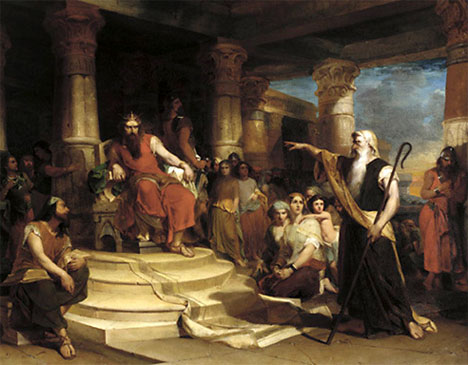Q&A: Against You Only Have I Sinned
 “…there is no sacrifice to Bathsheba…”
“…there is no sacrifice to Bathsheba…”
Jon Ericson asked this question on the Biblical Hermeneutics site:
To what extent is Psalm 51:4 poetic exaggeration?
The context of Psalm 51 is clear:
To the choirmaster. A psalm of David, when Nathan the prophet went to him, after he had gone in to Bathsheba.
These events are described in 2nd Samuel 11–12. In summary, David essentially murdered Uriah the Hittite in order to cover up an affair with Bathsheba, Uriah’s wife. So this verse causes me trouble:
Against you, you only, have I sinned
and done what is evil in your sight,
so that you may be justified in your words
and blameless in your judgment.
—Psalm 51:4 (ESV)
David did sin against God, but it seems a stretch to say that he sinned against God only. Surely he sinned against at least Uriah, the soldiers who died with him (and their families), Bathsheba, his current wives, and even his unborn child. In addition, he probably sinned against Joab too by abusing his authority to settle a personal matter.
The logical connector “so that” seems out of place. Whatever connection there might be between a person sinning against God and God being blameless in judgment, I can’t see how justice could be the purpose or explanation of sin.
Is there some way to understand this Psalm that resolves this conundrum? What am I missing?
The best answer (I believe) comes from Qoheleth-Tech:
Not a Hyperbolic Expression
The Text of Psalm 51:4:
לְךָ לְבַדְּךָ ׀ חָטָאתִי וְהָרַע בְּעֵינֶיךָ עָשִׂיתִי
לְמַעַן תִּצְדַּק בְּדָבְרֶךָ תִּזְכֶּה בְשָׁפְטֶֽךָ׃Explanation
1) “Against you alone” (לְךָ לְבַדְּךָ): This is a prayer of David for repentance (a penitential psalm), and while he sinned against many others in the affair with Bathsheba, this is just not where he handles them (possible reasons are many). He says it is “in your [God's] eyes [בְּעֵינֶיךָ] that I have done this” , further indicating that this is a personal prayer (which was later set to music). Interestingly, having looked at most of the “so that” (לְמַעַן ) phrases in the canon to this point, I found at least two where a sin condition was “so that” God would be glorified; and both are instances where enemies are hardened or defeated (Ex.10:1, Dt.2:30). If anything can be drawn from that syntactical similarity, it would be that David see himself who has been completely undone, so that God can be shown victorious (LXX) in his judgements. In any case, this is how he uses the preposition “so that” (לְמַעַן).
2) We should not read the verse with an emphasis on purpose as if David’s purpose in sinning was so God would be glorified (cf. Rom.3:5-8). Rather, it is the second part of the verse which dictates the first: it was all against Him alone, “(so) that” God will be victorious. The purpose of this verse in the Psalm is to declare that God will be victorious/justified in His judgement of David’s sins. The second line of the verse is the point. In this sense, it is the purpose of the preceding verse. To understand this better, read the second line first. Try and think of it again with the second line first.
Interpretation
In this penitential prayer, there is no sin to be reserved, as if it was not against God, it was all against God. Every bit of it. God is just in judgement in all of it. The same portion against Uriah, was also against God. David must answer to God above all.
Likewise (as is evident in this Psalm) when God pardons David’s sins, he washes away all of David’s sins – there is no sacrifice to Bathsheba. David’s forgiveness was entirely with God. Whatever else was needed for the personal restoration/reconciliation with those against whom he sinned would also be in primary obedience to God.

























